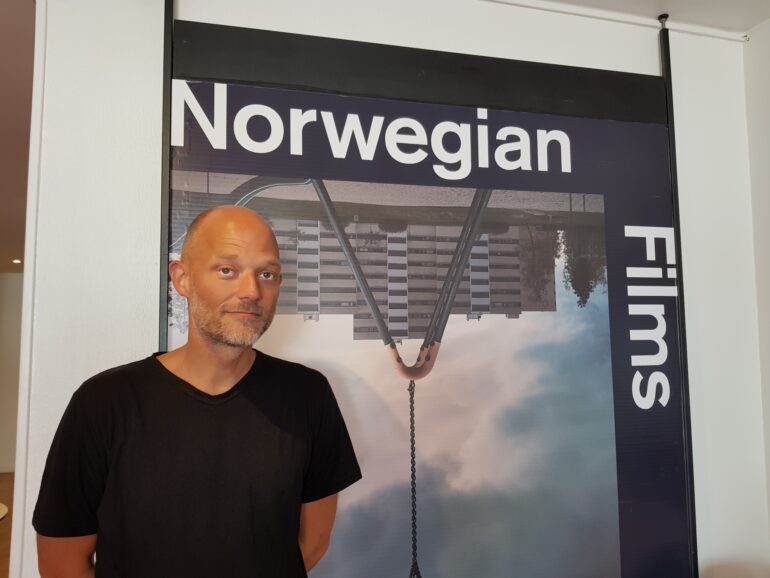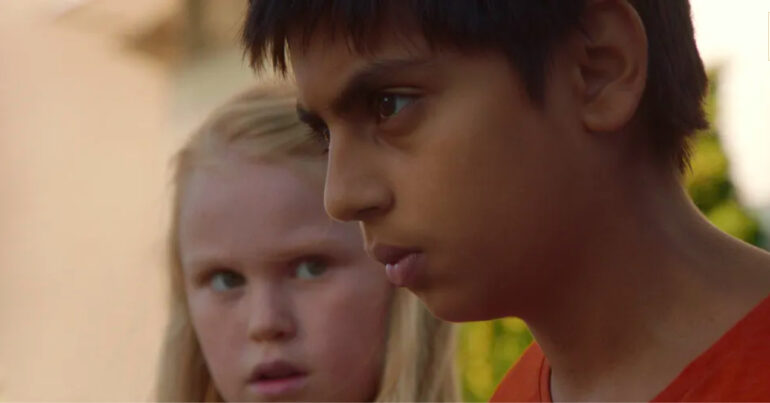WRITTEN BY: Annika Pham
Cannes 2021: The Norwegian writer/director kept Cannes audiences on the edge of their seats on Sunday July 11 at the world premiere of The Innocents at Un Certain Regard.
Vogt made his mark on the Cannes 2021 audiences and media.
After his presence on the red carpet on Thursday alongside director Joachim Trier, for the official screening in competition of The Worst Person in the World (co-written with Trier), Vogt was on the Croisette on Sunday for his sophomore film as writer/director, The Innocents.
The former graduate of the French film school La FEMIS was on hand for new photo ops, together with Mer Film producer Maria Ekerhovd, actress Ellen Dorrit Pedersen and child actors Rakel Leonora Flottum, Alva Brynsmo Ramstad and Mina Yasmin Bremseth Asheim.
The eery movie The Innocents follows four children who become friends during the summer holidays - Ida (Rakel Lenora Fløttum), her elder sister Anna (Alva Brynsmo Ramstad), their friend Aisha (Mina Yasmin Bremseth Asheim) and Ben (Sam Ashraf). Out of sight of the adults, they discover they have hidden powers. While exploring their newfound abilities in the nearby forests and playgrounds, their innocent play takes a dark turn and strange things begin to happen.
The film was a hit with reviewers in the trade press such as Screendaily’s Fionnuala Halligan who described it as “a clever, engaging and often electrifying feature which straddles suspense and the arthouse in a tight and satisfying way”, or Variety’s Jessica Kiang who said: “Exceptional child performers and a superbly eerie yet gritty atmosphere distinguish this darkly satisfying art-house chiller.”
The film was produced by Norway’s Mer Film, in co-production with Zentropa Sweden, Finland’s Bufo and Denmark’s Snowglobe, with support from the Norwegian Film Institute, the Finnish Film Foundation, Eurimages and Nordisk Film & TV Fond. Protagonist Pictures handles world sales.
Mer Filmdistribusjon will release it in Norway August 27.
We sat together with Eskil Vogt yesterday in Cannes at Protagonist Pictures Cannes Grand Hotel office.
I’m curious first about your writing process as you’re in Cannes with two films…
Eskil Vogt: I’m a slow writer, so if I don’t put in the hours, nothing will happen! it’s a miracle that two of my films are coming out the same year! This is why my last feature [Blind] was made seven years ago. With Joachim [Trier], we’re such good friends and naturally sit down to discuss stuff. We want to find subjects that are relevant and resonate with people. There are too many films being made, so many classics that you can watch until the day you die. I won’t make another movie for the sake of making a movie.
What do you find most thrilling about directing?
EV: What I enjoy most is the collaborative process of working with people who are better than me in their craftsmanship. Exchanging ideas for instance with an editor is wonderful. Editing is actually under-rated. The construction, composition of a movie happens there, in the editing room. Then I also love working with cinematographers. My first feature Blind was filmed by Thymios Bakatakis who’s worked with Yorgos Lanthimos. But here, as we had to work with small kids, I needed a Norwegian language DOP. Sturla Brandth Grøvlen (Another Round, Heartstone, RAMS) is Norwegian but this is his first Norwegian feature film. He has a very interesting methodology with actors, and a calm and reassuring personality-typical Scandinavian! He was perfect to work with kids.
What was the scariest memory of your childhood?
EV: It’s nothing specific, it’s abstract fears, sometimes it’s something absurd. When I was really small, I was afraid of bears attacking humans. I lived in a big apartment building along the lines of the movie, on the 6th floor, surrounded by a forest, but I was still afraid a bear would come at night! It’s often very abstract things from your imagination. Kids are so sensible.
What was the original idea behind the film?
EV: When I became a father, I started being interested in the mystery of childhood-how kids apprehend the world. When you have kids, you rediscover childhood, and you do that on different levels, by seeing how they cope with stuff, even if they don’t have words to express themselves, and you never quite know what goes on in their minds.
At the same time, you get a huge surge of memories from your own childhood, not necessarily important memories, but just the feeling of how it was to be a kid.
Could you expand on the title The Innocents, the notion of good, evil, moral behaviour in children?
EV: I was interested to explore how children develop a sense of morality and empathy. Morality has to be taught by parents and society. But then again, do you have real moral values if all your models are - my mother says this is bad, or my father says I can’t do this… is this your moral values or your parents’ values?
In the movie, without spoiling things, I ask, do you have to transgress things to find your own sense of morality? You have to make mistakes, to learn from them. When an adult does something morally wrong, it’s easy to say he’s evil, but with a child, it’s not so easy because they are not fully formed, they are not responsible for their actions. It raises complex questions.
And indeed from the inception we see the little boy Ben acting in an evil way, being cruel to animals, to people, with only glimpses of his social and family background…
EV: Ben is not evil. Evil kids don’t exist and I even have a hard time thinking that evil exists. There might be evil acts, not evil people. The important element here is that we feel for him, even when tragedy strikes. I wanted to give glimpses of his background, but not over-explain things. You see enough to understand that he doesn’t have the safest home, and that’s partly why his empathy develops a bit later than for other kids who grow up in caring homes, like Aisha who has a loving mother and who gives her moral values.
Did you have film references in mind?
EV: I have a lot of references. But this movie had nothing to do with them. It’s more about the magic world of childhood, not a puberty metaphor with a superhero! That said, I revisited great movies to get a sense of child acting, like Ponette, The Spirit of the Beehive. I also had the Japanese manga writer/director Katsuhiro Otomo (Akira) as inspiration. He also inspired our cinematographer, as his universe is very real, but also stylised.
Could you discuss the casting of the children and if you rewrote and adapted the parts after you had found the child actors?
EV: Yes. I wrote four characters. They were very specific in their dynamics, psychology, but I was very conscious that we needed to find four exceptional child actors. We couldn’t miss out of someone just because I imagined him/her having brown hair for instance. We had the most diverse casting - I changed the gender and ethnicity of the characters because I found great child actors and wanted them in the movie.
The kids really enjoyed the work, even the toughest scenes. For them it was like a game. That doesn’t mean that they can watch the finished film! They went out during the premiere in Cannes and came back afterwards.
What clues did you give the kids about the story which is quite disturbing?
EV: Parents were informed. Then I talked to the actors about their characters - so those who have a more tragic arc knew that before they accepted their part. But I couldn’t explain the full screenplay. Kids don’t have that attention span.
During pre-production, we took our time, worked in practical workshops so that the kids could react spontaneously. I had the rule that if they asked questions I would answer truthfully. They asked plenty of questions, during costume fitting, or when we rehearsed the stunts. So when we started shooting, they knew everything about what happened with the characters. I never wanted to trick them into a situation to get a spontaneous reaction. We had to collaborate.
Where the parents on set?
EV: No except Ellen Dorrit Pedersen, whose daughter in real life is Rakel Lenora Fløttum who plays the major role of Ida. We cast the girls first, had thousands of kids registered, and we tested several hundred girls several times. I cast Rakel and made sure Ellen would be OK for us to do a test as I didn’t want her daughter to freeze up in front of her mother on set. It was a gift to have a family.
What was the most challenging?
EV: Working with kids was difficult, but when we started shooting, all the preparation paid off. It was a dream to work with the kids. At some point I felt I wouldn’t have been able to get more out of professional actors. But then we also had a cat on set. That was terrible!
Could you discuss the light, shooting a scary movie during the summer?
EV: One of the first things we discussed with Sturla is the type of scary film we were shooting which was set during the long summer days in Norway. How would we create a sense of unease? Being afraid of darkness always works. But here we didn’t have that. We used other ways -like capturing the sense of an abandoned place during the summer vacation, having wide shots where you feel there is no one, then extreme close ups, details of objects that kids focus on. We had the kids themselves, with their secret life, the forest, and slowly, we created a mood that was perhaps ahead of the scary movies set in the dark. Here you are never safe in board daylight - dangerous things can happen anytime.
Can you expand on the sound and the score that add to the creepy atmosphere?
EV: Working on European movies, usually we try to make a strength instead of a weakness out of co-production requirements. Here I was so lucky and I feel we managed to do that. The cinematographer is Norwegian, one of the top people in the world, but he is based in Denmark. Then we had a Finnish co-producer (Bufo) who provided top people, such as the foley artist, make up designer, and they suggested for me to talk to a composer - Pessi Levanto, which I did. He had the right vision of what this movie should be and wanted to use unique instruments, original instruments to create a scary feeling. It was a joyful collaboration.
Are you excited that the film will most probably reach a large international audience after Cannes?
EV: I always make films with the intention of reaching a wide international audience. I love the fact that movies can travel, watching films from all over the world. Cannes is the best launching pad ever.


